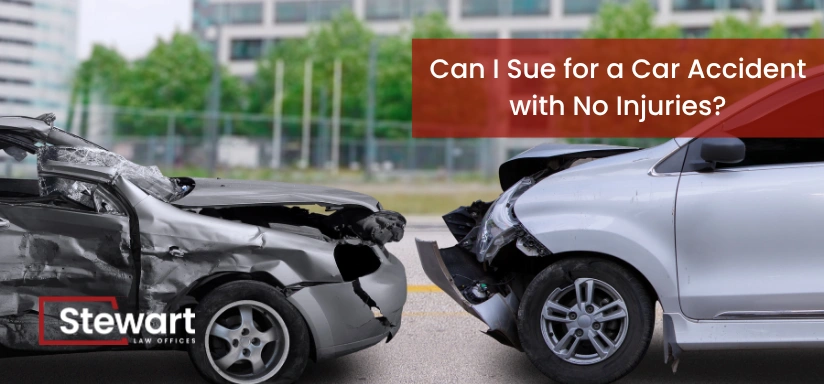Not every car accident leaves people injured, but that doesn’t mean you’re without options. Even if you walked away without a scratch, you still face costly repairs and other losses caused by another driver’s negligence. South Carolina law allows you to file claims for property damage, even without physical injuries.
Understanding your rights can help you decide whether to file an insurance claim or take legal action to recover what you’ve lost.
Property Damage and Emotional Distress Claims in South Carolina
You can file a claim after a car accident even without physical injuries. South Carolina law allows you to pursue compensation for property damage after an accident.
For most people, the most immediate loss after a crash is damage to their vehicle. Every South Carolina driver must carry minimum auto insurance coverage of 25/50/25, meaning $25,000 for bodily injury per person, $50,000 per accident, and $25,000 for property damage (S.C. Code § 38-77-140).
The at-fault driver’s insurance covers up to $25,000 in property damage per accident. This can help pay for:
- Vehicle repairs or replacement
- Rental car costs
- Towing expenses
- Diminished value claims if your car is worth less after repairs
In South Carolina, you have three years from the accident date to file a property damage lawsuit.
Without physical injuries, you typically cannot recover damages for emotional distress, even when severe and well-documented. South Carolina allows emotional distress claims without physical injury only in bystander cases, when you witness a close family member experience severe injury or death.
If you walked away unharmed and alone, South Carolina law typically bars emotional distress damages. However, if you suffered physical injuries, you can recover emotional distress damages as part of your injury claim.
Steps to Take After a Car Accident
If you are not injured, it’s easy to overlook important steps at the crash scene. But to maximize your claim, you should:
- Call the police if total damage exceeds $1,000.
- If police don’t respond, file an FR-309 with SCDMV within 15 days.
- Take photos of vehicles, skid marks, and damage.
- Get witness statements; they strengthen your case.
- Keep repair estimates and receipts (towing, rentals, repairs).
- Seek mental health treatment if needed, counseling records help prove emotional harm, but in South Carolina, emotional distress claims without physical injury are only allowed in limited cases.
Insurance Claims vs. Lawsuits in South Carolina
Most property damage claims start with the at-fault driver’s insurance company. South Carolina follows a fault-based system, meaning the driver who caused the accident is financially responsible. You can file directly with their insurer or through your own company, which may then seek reimbursement.
Sometimes, however, an insurance claim isn’t enough, especially if:
- The insurer denies liability
- Repair costs exceed coverage limits
In these cases, filing a lawsuit may be necessary to recover the compensation you’re entitled to under South Carolina law.
When to Consider Filing a Lawsuit Instead of Just an Insurance Claim
While most property damage claims are settled through insurance, certain situations may require filing a lawsuit, such as when the insurer delays or denies payment, or offers a settlement far below your actual repair costs.
If the at-fault driver is uninsured or underinsured and settlement negotiations fail, legal action may help you recover additional compensation. A lawsuit allows you to present evidence in court and potentially recover compensation that exceeds the insurer’s initial offer.
What if the At-Fault Driver Is Uninsured or Partially at Fault?
South Carolina requires drivers to carry uninsured motorist (UM) coverage in their policies under S.C. Code § 38-77-150. If the at-fault driver is uninsured, your UM coverage may compensate you for property damage, subject to the deductible outlined in your policy.
Fault plays a critical role in determining compensation in South Carolina accidents. South Carolina uses a “modified comparative negligence” rule, which means your compensation can be reduced if you share fault for the accident. Your compensation is reduced in proportion to your share of fault in the accident. However, if you are found 51% or more at fault, you cannot recover damages under South Carolina law.
Underinsured motorist (UIM) coverage is optional but recommended to cover losses above the at-fault driver’s limits.
How Much Compensation Can You Recover Without Injuries?
Even without medical bills, you may still recover compensation for:
- Vehicle repair or replacement costs
- Rental car expenses
- Personal property damage (like electronics or valuables inside the car)
The exact value depends on the extent of your losses, the insurance coverage available, and whether you can prove additional damages beyond property repair.
How a South Carolina Car Accident Attorney Can Help
Car accidents without physical injuries may appear simple, but insurance companies often work to reduce property damage payouts or reject emotional distress claims. An experienced South Carolina car accident lawyer can investigate the crash, gather crucial evidence, and handle negotiations with insurers.
At Stewart Law Offices, we’ve helped countless accident victims, with and without injuries, pursue justice.
If you’ve been involved in a car accident and want to explore your legal options, we’re here to help. Call Stewart Law Offices today at 866-783-9278 or contact us online to schedule your free consultation.
